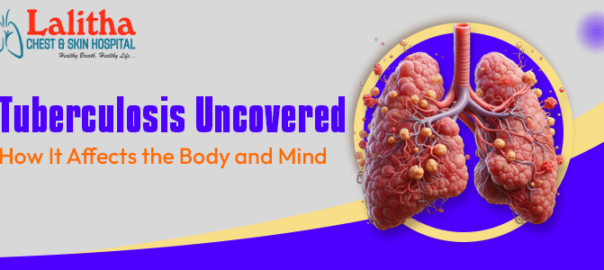Tuberculosis (TB) remains a significant global health issue, affecting millions annually despite medical advancements. This article examines how TB impacts both physical and mental health, aiming to provide a clearer understanding of this enduring disease.
According to Dr. Raj Kumar Korra, a leading tuberculosis specialist in Karimnagar, tuberculosis (TB) is a serious infectious disease that primarily affects the lungs but can also spread to other parts of the body. Early detection and appropriate treatment are essential for effective management and prevention of transmission.
What is Tuberculosis?
Tuberculosis (TB) is an infectious disease caused by the bacterium Mycobacterium tuberculosis. While it primarily targets the lungs, it can spread to other areas like the kidneys, spine, and brain. TB spreads through airborne droplets released when an infected person coughs, sneezes, or speaks, making it highly transmissible in close-contact settings.
Physical Effects of Tuberculosis:
- Pulmonary Symptoms
The lungs are the most commonly affected organs. Symptoms of pulmonary TB include:
- A persistent cough lasting more than three weeks
- Chest pain
- Blood or mucus in cough
Lung tissue damage caused by TB can lead to scarring and reduced breathing capacity. Without timely treatment, it may result in severe respiratory issues.
- Extrapulmonary TB
When TB bacteria spread beyond the lungs, they can affect other body parts, leading to:
- Skeletal TB: Involves bones and joints, causing pain and deformities.
- Meningitis: Infection of brain and spinal cord membranes, resulting in severe headaches, confusion, and seizures.
- Abdominal TB: Affects the digestive system, causing pain, diarrhea, and significant weight loss.
- Systemic Impact
TB often leads to systemic symptoms such as fever, night sweats, fatigue, and drastic weight loss, historically referred to as “consumption” due to the body’s wasting appearance.
Mental Health Effects of Tuberculosis:
- Emotional Stress
A TB diagnosis can induce considerable emotional strain, including:
- Anxiety over the disease’s progression
- Fear of infecting family and friends
- Social withdrawal due to perceived stigma
- Cognitive Challenges
Causes:
- Memory problems
- Difficulty focusing
- Long-term mental impairment
- Social Stigma
The stigma associated with TB often worsens patients’ mental health, leading to feelings of isolation, shame, and depression.
The Path to Recovery:
- Early Detection:
Symptoms such as persistent coughing, unexplained weight loss, fever, and night sweats should not be ignored. Prompt testing can prevent the disease from worsening.
- Adherence to Treatment:
TB is treatable with antibiotics, but strict adherence to the full course of medication is essential to prevent drug resistance.
- Holistic Care:
Integrating physical and mental health support can improve outcomes for TB patients. Counseling, support groups, and adequate nutrition play crucial roles in recovery.
Global Efforts to Combat TB:
The World Health Organization (WHO) aims to eliminate TB as a public health threat by 2035 through initiatives such as:
- Enhancing TB diagnosis and treatment access.
- Raising awareness to reduce stigma.
- Promoting research into faster and more effective treatments.
“Tuberculosis is not just a physical illness; it affects emotional and social well-being, underscoring the need for comprehensive care and support. Understanding its impact can foster empathy and drive efforts to combat this disease. With medical advancements and community involvement, we can move closer to eradicating TB and its far-reaching consequences”, says chest specialist in Karimnagar Dr. Raj Kumar Korra.
If you are looking for TB treatment and find yourself searching for phrases like “best TB specialist near me” or “TB hospital near me” to get help for your TB issues, let us help you save time. Dr. Raj Kumar Korra, a Gold medallist and renowned TB doctor, is an expert in resolving persistent lung and chest problems. Schedule your appointment today by visiting our website: https://lalithachestandskinhospital.com/


